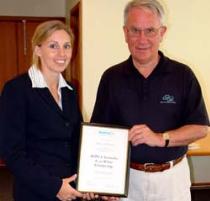Study to expose animal hoarding problem
Published on 18 January, 2005
An Australian-first study into animal hoarders is expected to reveal overwhelming numbers of animals being kept in unsanitary conditions and harmful environments in the Central Qld region.
Central Queensland University Psychology (Honours) student Shuron Billman has been awarded the 2004 RSPCA Australia Alan White Scholarship for Animal Welfare Research to pursue her study: ‘Characterising the Psychological Underpinnings of Animal Hoarders: A CQ study’.
 Anecdotal reports from veterinarians, law enforcement agencies, allied mental health professionals and the RSPCA suggest animal hoarding is rife.
Anecdotal reports from veterinarians, law enforcement agencies, allied mental health professionals and the RSPCA suggest animal hoarding is rife.
Ms Billman said that gauging the rate of animal hoarding within the region and developing a profile of hoarders will help the RSPCA and law-making bodies address the problem.
Scientific Officer for RSPCA Australia, Dr Bidda Jones said: "Our inspectors regularly encounter cases of people collecting or hoarding animals in distressing circumstances where both the animals and the people involved need assistance. RSPCA Australia is keen to support research into the psychological underpinnings of this behaviour through the award of the Alan White Scholarship. We hope the research will help us better understand why people hoard animals and improve strategies for responding.”.
The study will reveal the high numbers of animal hoarders in the region and the ‘psychology’ behind the phenomenon. It will track patterns of interactions among agencies when responding to these cases. Initial research has determined that animal hoarders are not confined to a particular social or economic group.
“Animal hoarding shares many features of obsessive-compulsive disorder (OCD), but is seldom considered a symptom of psychopathology,” Ms Billman said.
“The collection of animals becomes a concern when the number overwhelms the ability of the hoarder to provide acceptable care. Hoarders lack insight into the severity of their living conditions and deny the risks or harm posed to animals,” Ms Billman said.
Animal protection laws specify that companion animals must be kept in sanitary environments and receive proper nutrition, potable water, and necessary veterinary care to relieve suffering. The typical animal hoarder is likely to violate these requirements and breach RSPCA policies relating to responsible pet ownership, population control, breeding and keeping wild animals as pets.
Ms Billman said deliberate animal abuse and neglect have already been identified as a valuable indicator of various forms of family violence and dysfunction.
“Potential for animal hoarding to act as a sentinel could facilitate identification of other unmet human health/medical needs. Clearly, this public health problem merits greater attention and requires further study to disclose precisely its nature and cause. I hope the findings of this study may encourage a better coordinated intervention that could prevent substantial animal suffering and could provide needed services for the animals and hoarders involved,” Ms Billman said.
Photo: CQU Psychology (honours) student Shuron Billman was presented with the RSPCA Australia Alan White Scholarship for Animal Welfare Research in December at RSPCA Victoria to pursue her research into animal hoarders in Central Queensland. She is pictured here with Dr Hugh Wirth, President of RSPCA Australia.

